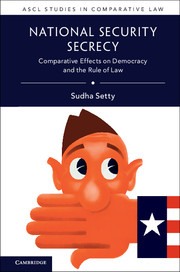
- Cited by 5
-
Cited byCrossref Citations
This Book has been cited by the following publications. This list is generated based on data provided by Crossref.
Curtin, Deirdre 2018. Second order secrecy and Europe’s legality mosaics. West European Politics, Vol. 41, Issue. 4, p. 846.
Fabbrini, Federico 2018. Courts and the politics of secrecy: national security, human rights and the importance of supranational oversight. West European Politics, Vol. 41, Issue. 4, p. 869.
Stampnitzky, Lisa 2020. Truth and consequences? Reconceptualizing the politics of exposure. Security Dialogue, Vol. 51, Issue. 6, p. 597.
Swed, Ori Kwon, Jae Feldscher, Bryan and Crosbie, Thomas 2020. The Corporate War Dead: New Perspectives on the Demographics of American and British Contractors. Armed Forces & Society, Vol. 46, Issue. 1, p. 3.
Heupel, Monika Heaphy, Caiden and Heaphy, Janina 2022. Seeing reason or seeing costs? The United States, counterterrorism, and the human rights of foreigners. European Journal of International Relations, Vol. 28, Issue. 1, p. 131.
- Publisher:
- Cambridge University Press
- Online publication date:
- July 2017
- Print publication year:
- 2017
- Online ISBN:
- 9781316440674
- Subjects:
- Constitutional and Administrative Law, Law, Comparative Law
- Series:
- ASCL Studies in Comparative Law




